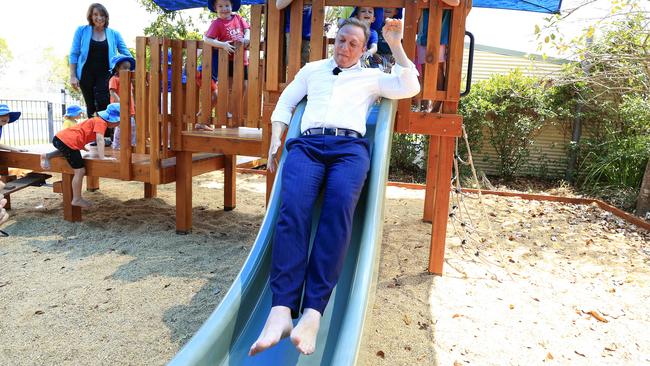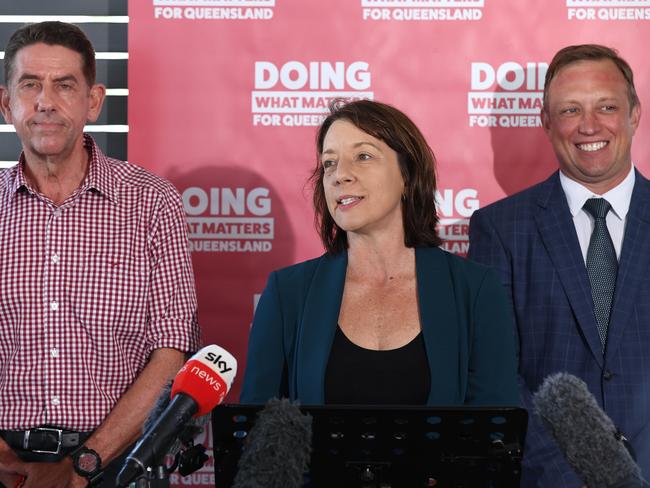Opinion: Couldn’t be more obvious why Qld regions abandoned Labor
At the recent state election Labor lost this seat for the first time ever. The reasons should be obvious, writes Warren Mundine.
Opinion
Don't miss out on the headlines from Opinion. Followed categories will be added to My News.
It should have been no surprise that Labor was smashed in regional Queensland at the state election.
Queensland Labor’s embrace of progressive policies popular with the urban elite meant it had abandoned the regions.
These communities have suffered.
They have suffered from inflation driven by government spending and energy transition.
They have suffered with job losses from baseload power stations being wound down while their communities make way for the forests of wind farms, carpets of solar panels and untold miles of high-voltage transmission lines.
They have suffered from soaring crime fuelled by progressive ideologies, a tourism industry regularly undermined by activist lies about the health of the Great Barrier Reef, and with coal industries demonised – even as they carry the state’s economy.
Queensland Labor talked a lot of talk about renewables and energy transition.
But its big-spending government was funded by royalties from coal mining and dividends from coal power stations.

At the same time Labor attacked Queensland’s coal-based industries and, in doing so, they attacked the communities which depend on the coal industry for their livelihoods.
Labor raised Queensland’s coal royalties to the highest level in the world.
In the short term this delivered a record surplus to fund Queensland Labor’s election spending, including billions to fund its energy transition agenda and power bill rebates to compensate people for that agenda.
But over the medium to longer term this decision will destroy jobs, with billions of dollars of mining projects cancelled or postponed.
Queensland’s once-booming coal mining industry is now looking towards more competitive markets elsewhere.
Coal companies directly or indirectly support over 372,000 Queensland jobs.
That is 13.5 per cent of total state employment, and that proportion is much higher in regional Queensland.
Labor’s faceless operatives in Brisbane may be shocked that the party lost Mackay for the first time. But I’m not.
The resources sector supports a significant proportion of regional employment in Mackay, and in 2022-23 coal accounted for over 97 per cent of the billions in direct resources-sector spending in the region.
BHP has seven metallurgical coal mines in the Bowen Basin and the Hay Point Coal Terminal near Mackay.
This year BHP announced it will cease further investments in Queensland’s coal industry due to Labor’s royalty hikes.
When you set out to destroy an industry in a community where alternative employment opportunities are scarce, you set out to destroy that community.
Unemployment and increased welfare dependency lead to socio-economic decline and dysfunction.
This is an especially hard cycle to break in regional areas.
Regional Queenslanders don’t want gimmicks like 50 cent bus fares that mostly benefit those living in the cities.

They want a secure job, to be able to provide for their families, raise their children in a good community, to own their own home, and feel safe in it at night.
But this war on the regions by the progressive Left that now dominates the Labor Party is not happening in Queensland alone.
We saw it in Environment Minister Tanya Plibersek’s decision to side with green activists and stop a gold mining project in western NSW by issuing an Indigenous heritage protection order, against the advice of the Orange Local Aboriginal Land Council.
We saw it in Prime Minister Albanese’s decision to fold the Jabiluka uranium deposits into Kakadu National Park, ensuring there will never be mining at Jabiluka – not now and not in the future.
We saw these same tactics fail to block the Carmichael coal mine in central Queensland in the lead-up to the 2019 federal election.
But the result may have been different if Albanese and Plibersek had been in power.
Their inner-city seats are a hive of urban, progressive elites and are most vulnerable to green-Left challengers who are out of touch with the realities of those living in regional communities.
Plibersek also appears to be laying the groundwork to block gas extraction in Beetaloo Basin, requesting a government-appointed scientific panel to advise on the impact on water resources while being urged by Green activities to use new “water trigger” powers to stop it altogether.
Queensland Labor followed in the footsteps of its federal colleagues and consequently lost in the working-class areas of regional Queensland.
The so-called Labor heartland has been rejected by the party that used to support its interests. And now it has returned the favour in kind.
Nyunggai Warren Mundine AO is a former National President of the Australian Labor Party and Indigenous Forum director at the Centre for Independent Studies. He is chair of Fuse Minerals and non-executive director at Aura Energy.



